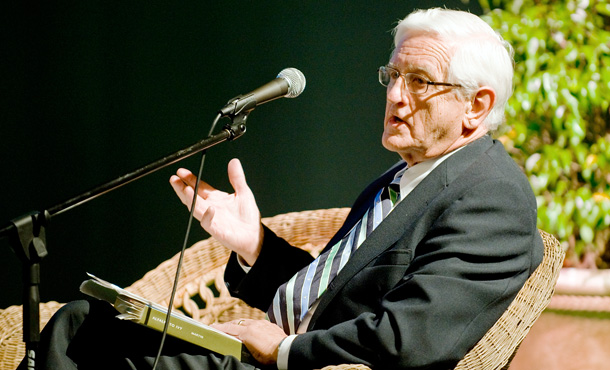Courtesy Daily News Record
HARRISONBURG — Joseph Martin, a native of Canada and Eastern Mennonite University graduate, credits a firm foundation in reality, tempered with plenty of humor, as the cornerstone of his tenure as head of one the nation’s most prestigious medical schools.
Martin shared nearly 50 years of medical school wit and wisdom with about 75 people at Eastern Mennonite University Tuesday evening. His visit was the kickoff of a tour to support his new book, “Alfalfa to Ivy: Memoir of a Harvard Medical School Dean.”
Martin said his interest in medicine was inspired in part by visits from missionaries to his childhood church. They shared stories of success, connection and fulfillment in faraway places and he sought to follow in their footsteps.
“At the age of 16, I arrived in Edmonton to begin studies at the University of Alberta and I was frightened,” said Martin, quoting from his book. “The world outside Duchess [Alberta] seemed overwhelming, the big city huge and forbidding. It was vibrant with sophistication I felt I lacked.”
After three years there, including a year of medical school, Martin felt led to make a change. He transferred to then-Eastern Mennonite College to study music, church history, ethics and choral conducting.
Degree from Eastern Mennonite in Bible in 1959.
“EMC was an exhilarating place,” Martin continued. “I had never seen so many eligible Mennonite girls in one place.” The crowd laughed.
Ultimately though, he chose one girl, Rachel Wenger Martin ’61, to be his wife and they’re still married today.
Martin went on to earn a medical degree from the University of Alberta in 1962 and a doctorate in anatomy from the University of Rochester in 1971.
In his professional career, Martin has served as chief of neurology at Massachusetts General Hospital, dean of the school of medicine and later chancellor of the University of California, San Francisco.
In 1997, he was named dean of the Harvard Faculty of Medicine, a role he held until 2007. Today, he continues at Harvard as an endowed professor of neurobiology.
After his remarks, Martin responded to questions from the audience. One was what advice would he offer to Congress when it comes to health care reform.
He said in part that the primary care system must be strengthened. That doesn’t mean, he said, it’s time to educate more doctors.
Part of the problem, he explained, is that right now, a patient’s medical care is spread among so many specialists that it’s hard to manage.
Responding to another question, Martin also said health care reform legislation should be anchored in five fundamental principles: accessibility, accuracy, advice, affability, affordability. EMU President Loren Swartzendruber praised Martin’s insight at a reception following the program. “His wide range of experiences puts him in a position to speak with a great deal of authority,” Swartzendruber said. “He’s such a genuine person.”
At least one aspiring doctor, EMU junior Abigail Carr, came away inspired by Martin’s talk.
“It was fascinating to hear all the different insights he’s had over the course of his life in very relevant topics … and how it connects to the future,” said Carr, who is studying premedicine and biology.
